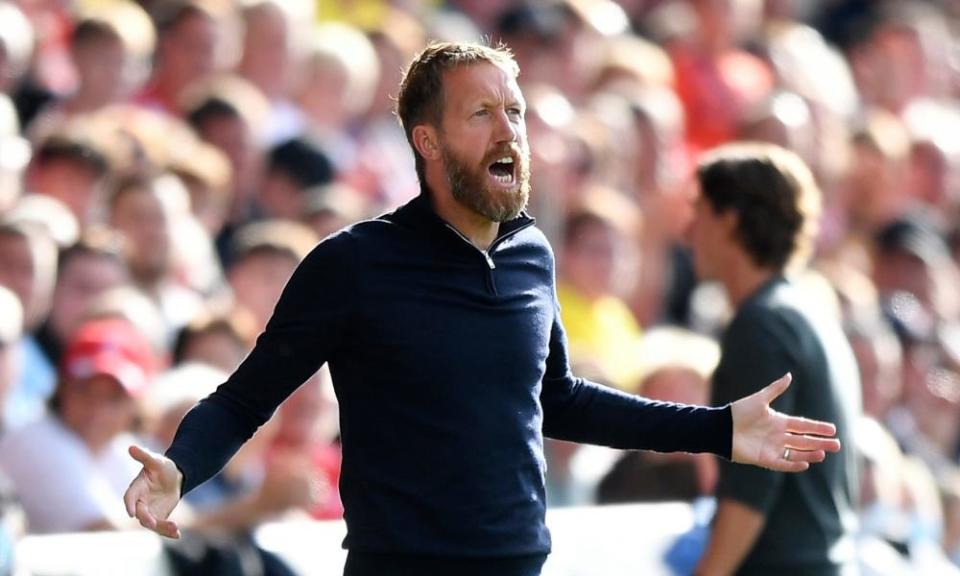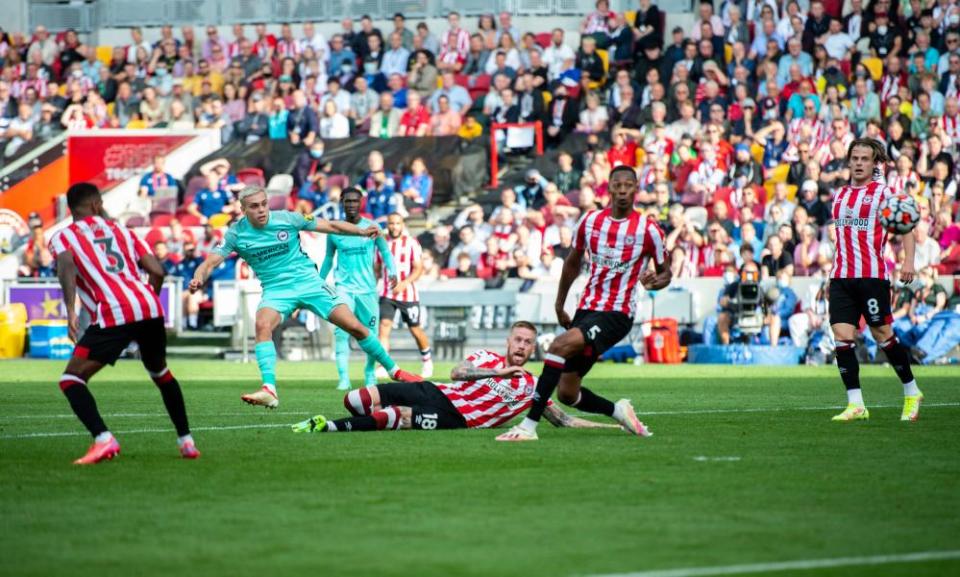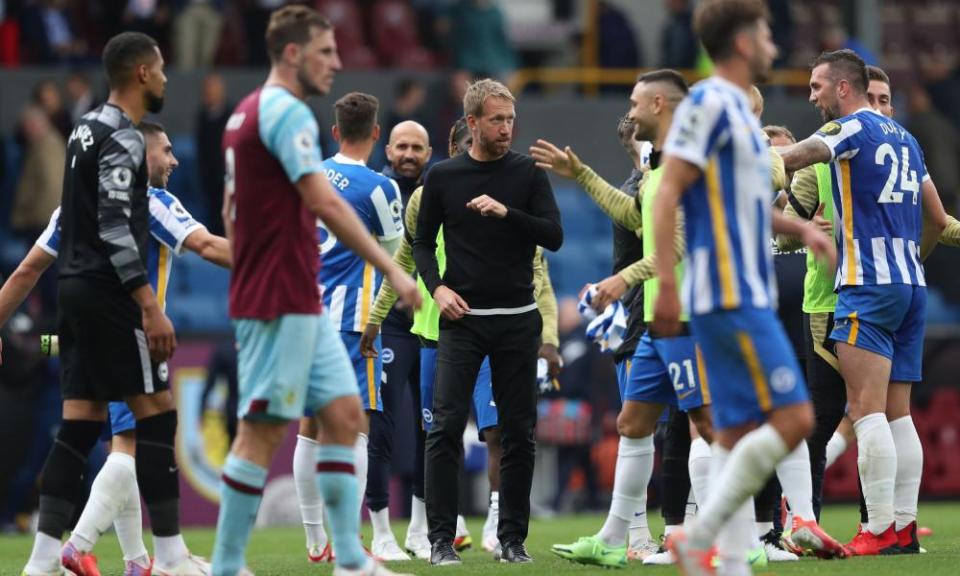Brighton are making strides under Graham Potter but hard yards lie ahead

xG is not a perfect tool. Models vary. They have flaws. But still, it is striking that most xG – expected goals – models for last season had Brighton finishing not 16th, as they actually did, but fifth or sixth. Imagine that had happened. Imagine Brighton, with the 15th-highest wage bill in the division, had qualified for the Europa League. It would have been an extraordinary achievement. Graham Potter might not have been named coach of the year ahead of Thomas Tuchel, but he would surely have nudged Marcelo Bielsa out of second.
More than that, Potter would have been a serious candidate to take the Tottenham job, rather than just somebody who was mentioned in passing. The (excessive) grumbling about Gareth Southgate would have a more sharply defined focus: here, the doubters would be able to say, is the ideal replacement. And yet the general tendency seems still to be to regard Potter as an oddity.
Related: Graham Potter: ‘I’ve shown there’s another path for English managers’
There has always been a suspicion in British football about those who go abroad. A sort of stag-do mentality prevails: what happens overseas stays overseas. Jimmy Hogan was the most influential coach of the first half of the 20th century, but for a long time in England he was regarded as a grumpy eccentric defined by a mildly disappointing late-career spell at Aston Villa. Bobby Houghton is all but forgotten now, while the general scorn surrounding Steve McClaren’s post-Middlesbrough career is largely unmitigated by his remarkable Eredivisie title at Twente. It was decades after he first won the Swedish championship that Roy Hodgson gained recognition at home.
Similarly, while there may be a vague sense that Potter did well in Sweden, the scale of his achievement in leading Östersund, with their tiny budget, to the top flight for the first time in their history and to a first ever cup success is rather lost beside the lurid tales of his more eccentric methods, having his squad produce a book together, initiate an art project and perform Swan Lake before an audience of 1,500.
The phrase used widely of him then in occasional British profiles was “emotional intelligence” and it’s perhaps testament to that that he has not attempted any amateur dramatics at the Amex. A loss to theatre as Shane Duffy’s interpretation of Lady Bracknell undoubtedly is, what works for lower-level players in Sweden, particularly those Potter was rehabilitating after difficult spells elsewhere, may not be so effective for Premier League regulars.

What he is doing appears to be working. Brighton’s positive start this season, it’s true, is to an extent a function of the calendar. A good second-half performance and the intervention of two substitutes secured a win at Burnley. They beat a Watford who look toothless away from home. They nicked a late winner at Brentford. Three wins out of four meant Brighton went into the weekend sixth – and they didn’t achieve a third league win last season until 16 January, which suggests significant progress.
There is a limit to what narrow wins over the sides likely to finish in the lower half of the table can say about the longer-term prognosis. In their one challenging game so far, at home to an Everton side who have begun the season extremely well, Brighton were well beaten. Even if they win on Sunday afternoon, the number of Leicester injuries – albeit several players are returning – means the impression will remain that they have been fortunate in the opponents they have faced so far.
There’s a semi-serious point lurking there about the order of games a side plays and whether more of an attempt should be made to avoid runs of stronger or weaker teams. Norwich, for instance, have faced the opposite phenomenon this season, playing Liverpool, Manchester City, Leicester and Arsenal – all top-eight sides last year. They were almost guaranteed a poor start – which could knock confidence before the more winnable games to come. Steve Bruce’s Sunderland reign fell apart when his side, having just sold Darren Bent, took one point from a run of eight league games in which they played the previous season’s top seven plus Stoke away.

Beyond such abstractions, the question for Brighton in whether this positive start is the result of a quirk of the fixture list or whether they have actually improved. It is worth examining those xG figures from last season a little more closely. They scored 40 league goals, 13.82 down on Understat’s xG model, and conceded 46, against an xG conceded of 39.81. This season there has, perhaps, been some regression to the mean: five goals scored against an xG of 4.45 and three conceded against an xG of 4.48.
The general perception was that Brighton lacked a clinical centre-forward – their top scorer was Neal Maupay with eight – but the problems were also at the other end of the pitch. The only striker who has been added is the 20-year-old Abdallah Sima from Slavia Prague and he has been loaned to Stoke. While positive noises have been made about the fact that Brighton have had four different league goalscorers this season, there are no guarantees chances will continue to be taken against better sides.
The deployment of Leandro Trossard as a free-ranging central player, though, is intriguing. The Belgian arrived from Racing Genk as a winger but operated behind a front two at Brentford, a role he relished. “From a central position, I can go out to either side and it’s tough to defend against me then,” he said. That Potter is willing to use him centrally is perhaps evidence of his open-mindedness and willingness to experiment.
With Enock Mwepu, signed from RB Salzburg, offering the potential of driving runs from deeper positions, it may be that the lack of a classic goal-scoring No 9 is less of an issue than it may at first appear – even if he looks rather more threatening for Zambia than he ever did in Austria.
After Leicester, Brighton have Palace, Arsenal and Norwich. Even two wins from those four games and, with a fifth of the season played they would be almost halfway to survival. And then, perhaps, they could begin to dream of Europe and the sort of achievement that would confirm Potter’s abilities.

 Yahoo Sport
Yahoo Sport 





































